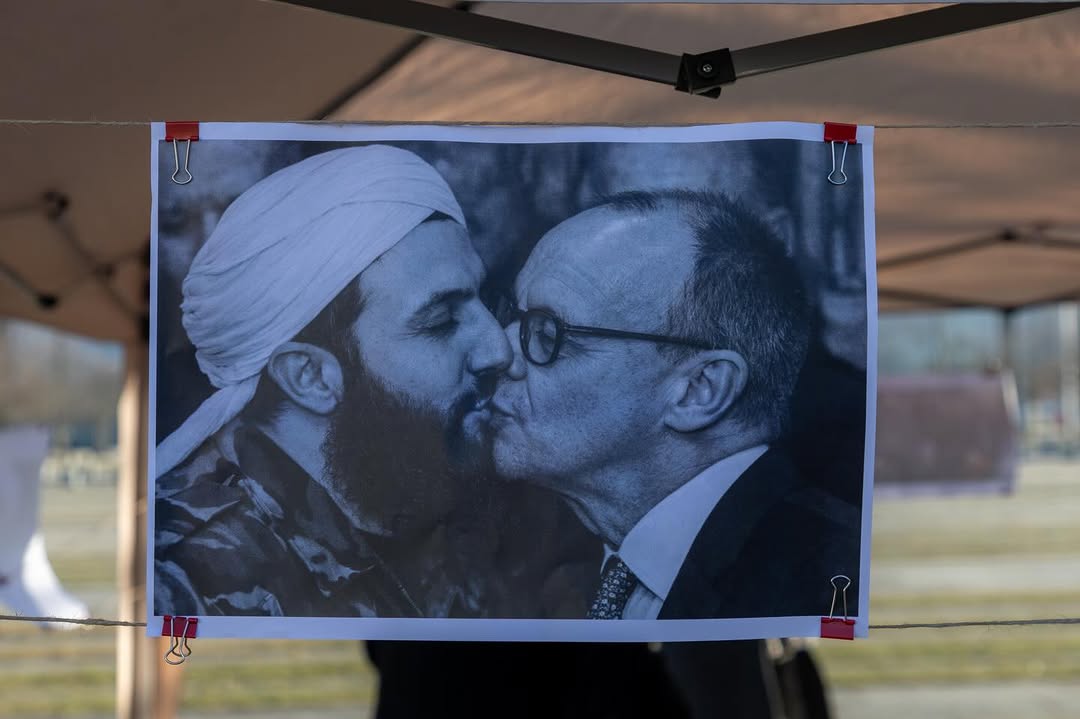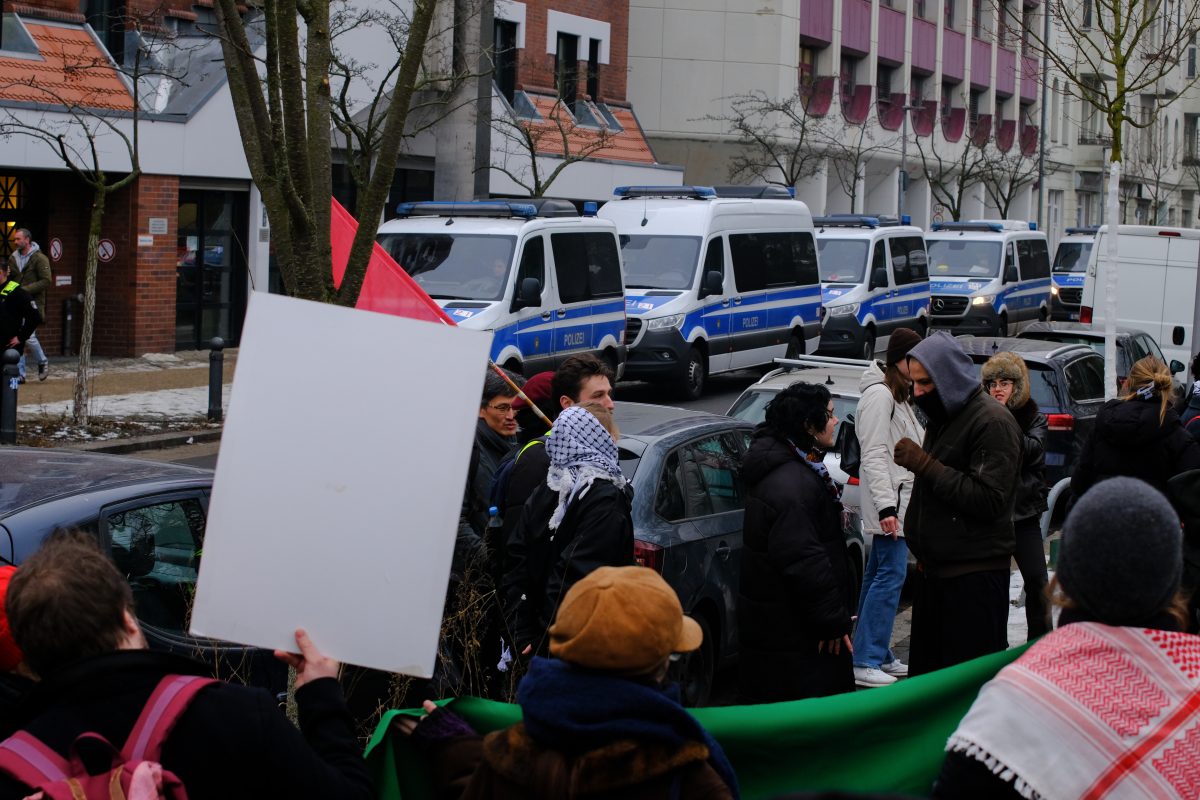All this week massive demonstrations have been taking place in Germany. This includes an estimated 350,000 who rallied on Sunday 21 January in Berlin.
The demos are in opposition to the Alternative für Deutschland (AfD) participation in a meeting held by right wingers and fascists in which they proposed to ‘remigrate’ vast sections of the German population.
The Correktiv magazine reported on a meeting held in a villa by a lakeside addressed by a far right wing extremist Martin Sellner, the Austrian leader of the ethno-nationalist Identitarian movement.
Plans were outlined for the future of certain communities in Germany. These communities were to be relocated to a territory in North Africa.
The meeting was attended by several high level members of the AfD, a right wing populist party with an increasingly dominant fascist wing, several prominent businessmen and even some members of the Tory-like CDU party.
This can be passed off as the ravings of deluded extremists, but comes at a time when the AfD are becoming the second party and the main opposition to an increasingly unpopular Red-Green-Yellow coalition of the Labour-like SPD, the Greens and a smaller pro business party, the FDP.
In several important upcoming state elections the AfD may take the leading positions.
It’s also a populist movement that comes from the countryside, is badly handled by the authorities, and shows signs of being influenced by the far right. The AfD MP, fascist Björn Höcke, strongly supports the farmers protests and demands. Martin Seller also supports them, and on some demos the flag of the Landvolkbewegung, an antisemitic countryside movement from 1920s, has been seen.
At the same time, increasing authoritarianism is evident in German policing. This is especially true of protests agains Israeli genocide in Gaza.
In the wake of October 7th, protests against the Israeli assault on Gaza were banned by the police. In Berlin’s Neukölln district people were arrested for showing visible signs of support for Palestine, including the wearing of the Keffiyeh. The slogan ‘from the river to the sea’ is prohibited, under threat of arrest. A main street, Sonnenalle, in a largely migrant area, was sectioned off and people were forced to undergo identity checks.
During one pro-Palestine demo, Jewish activist Iris Hefets was arrested for holding up the placard, “As an Israeli Jew: Stop the genocide in Gaza”. She was arrested again during another demonstration shortly after.
Last Sunday, the 14th of January, police attacked the annual Luxemburg-Liebknecht march, which has been held since the 1920’s, except during the Nazi years. The excuse was the pro-Palestine participants participating in the march. The police claim that a person was using the banned slogan. The attack took place near the former Stasi HQ in east Berlin.
This follows the German government’s total support for Israel and it’s attacks on Gaza. Former Chancellor Angela Merkel declared that support for Israel was a ‘reason of state’ for Germany. This is a semi-legal justification that makes Israel’s security a matter of national interest for Germany.
Some see this unwavering support as an exculpation of German guilt for the Holocaust, but other reasons may be involved.
It allows Germany to cover over its failure to fully denazify the state apparatus after the war. For example, many judges kept their positions. Consequently, antisemitism is still deeply imbedded in German society, and a long list of fascist organisations since the fall of Hitler has culminated in the AfD today. The police and other state security agencies show strong support for the right wing. Crime statistics regularly show that homegrown white supremacy far exceeds any supposed threat posed by people from a migrant background. The state knows this all too well, as a native-born German with far-right sympathies tried to shoot his way into a synagogue in the city of Halle in 2019, killing two people.
However a key reason for the German stance is that it allows Germany to cover its World War Two actions and remain on the international stage as an integral part part of the West’s military alliances.
The war in Ukraine saw a huge lurch towards militarism on behalf of the German government and its dominating parties. The traffic light coalition had planned to double the money – to €8 billion – given to Ukraine to continue the war against Russia. Germany is considering supplying Israel with around 10,000 rounds of 120-millimeter precision tank ammunition. This comes after other increases in military spending and a more aggressive stance towards the possibility of German military intervention through NATO, thus increasing the presence of German imperialism on the world stage.
German Chancellor Olaf Scholz joined in the anti-AfD march that took place in Potsdam as did his Green Party foreign minister Annalena Baerbock. It is she, of course, that is leading the increases in military spending.
They are rightly condemning the proposition by the AfD to construct an ethno-nationalist state around German nationalism and racism. Unfortunately, at the same time in Saxony-Anhalt the CDU-led government has made citizenship conditional on the acceptance of the right of Israel, an ethno-nationalist state, to exist. This racist measure is to be debated in the Parliament, the Bundestag, and made to apply to the entirety of Germany. It is being proposed by the Tory CDU but it is said that other parties are sympathetic.
The German left however, has a problem.
The German wing of Fridays for Future separated from the global movement when Greta Thunburg declared her support for a ceasefire in Palestine. It is reported that they have also prohibited pro-Palestine protesters from joining the anti-AfD rally in Berlin.
This is not unusual. The majority of the left it seems, goes along withe the reasoning of the German state. This includes the majority of The Left Party. Leftists that support Palestine have been denounced as anti-semites by others, and some have branded pro-Palestine supporters as ‘Nazi ticks’. How deep this goes is indicated by the crisis in the proclaimed antifascist supporters of Hamburg football club St Pauli. International groups have felt forced to disaffiliate and some closed altogether after bitter exchanges and the club’s failure to move away from its pro-Israel position. This includes major groups in Italy and Scotland.
Through perseverance and courage Palestinians and their supporters in Germany have managed to win the space to hold demonstrations. These have become more frequent as the situation in Gaza becomes ever more dire. The marches and protests are overwhelmingly Palestinians, other migrant communities and nationals from other European countries. The German left, apart from a few groups, is absent. It seems however that they are somewhat detached from German public opinion. In a recent poll by a leading broadcaster, 61% of people said that they thought Israel’s actions were not justified, with only 25% supporting them.
This attitude of the left is very worrying. The scapegoating of Muslims and migrants by the state can only lead to further deepening of the support of the AfD. Whilst those on the left see Palestinians and Muslims as a problem or inherently antisemitic they will be unable to tackle the AfD. It is Muslims, Palestinians and their supporters that are facing real discrimination on the streets now.
Recently The Left Party split around Sahra Wagenknecht, who wants to be, ‘economically progressive but socially conservative’. The left, she says, should stop going on about minorities, which can only aid the right. It is well proven that faced with real racist parties or ones opportunistically spouting racism people generally opt for the real thing.
The huge mobilisations against the AfD are of course to be hugely welcomed. It shows that underneath the seemingly calm exterior of German society there is uncertainty about the future and that there is a willingness to take to the streets about it.
The protests have been very popularly based. Their intention to culminate in a protest around the Reichstag indicates this. A nascent organisation seems to have been formed, with groups sprouting up around the country. A key demand is the problematic call to ban the AfD. That may halt its immediate advance but it won’t deal with the reasons for their growing popularity. Similarly, calls for the movement to be channeled into voting against them, whilst necessary, does not tackle the real problem.
That is the growing economic uncertainty in society and the detachment of politicians from the lives of the populace. It is also caused by the mainstream politicians’ demonising of migrants and by their Islamophobia.
To tackle that, a movement on the streets is needed, to call out the AfD as fascists and to confront them wherever they appear. But a social movement is also needed, one that can offer hope to the disenfranchised instead of the Nazi movement of despair.
The movement for Palestine has set off a huge global wave of radicalisation to the left.
The massive mobilisations and the refusal of people in Germany to swallow the lies about Palestinian resistance despite all the mainstream media and all the political parties telling them they should back Israel is a source of tremendous hope.
A small number of activists in Germany are working in the right direction.
I wish them luck.




